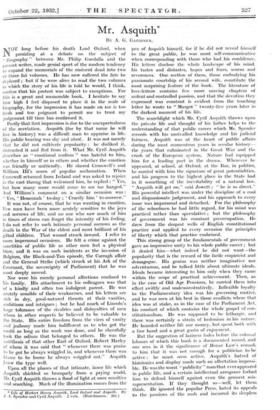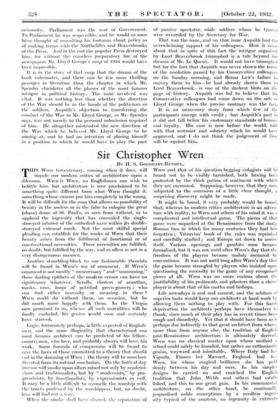Mr. Asquith* By A. G.
GARDINER.
NOT -long before his death Lord Oxford, when presiding at a debate on the subject of Biography " between Mr. Philip Guedalla and the present writer, made genial sport of the modern tendency to expand the memorials of the eminent dead into two or three fat volumes. He has now suffered the fate he deplored ; but if he were alive to read the two-volumes in Which the story of his life is told he would, I think, confess that his protest was subject to exceptions. For this is a great and memorable book. I hesitate to say how high I feel disposed to place it in the scale of biography, for the impression it has made on me is too fresh and too poignant to permit me to trust my judgement till time has confirmed it.
Partly that first impression is due to the unexpectedness of the •revelation. Asquith (for by that name he will live in- history) was a difficult _man to appraise in life. His public bearing was shy and aloof.. It was not merely that he did not cultivate popularity : he disliked it, distrusted it and fled from it. What Mr. Cyril Asquith describes as emotional nudism '•' was hateful to him, whether in himself or in others and whether the emotion was friendly or unfriendly. He shared Cromwell's and William III's scorn of popular acclamation. When Cromwell returned from Ireland and was asked to rejoice in the vast throng that welcomed him, he replied : " Yes, but how many more would come to see me hanged." And William's comment on a similar occasion was : " Yes, Hosannah ' to-day ; ' Crucify him ' to-morrow."
It was not, of course, that he was wanting in emotion.
Few men have been more acutely sensitive to the joys and sorrows of life, and no one who saw much of him in times of stress can forget the intensity of his feeling. I do not refer to such intimate personal sorrows as the death in the War of the eldest and most brilliant of his gifted children. That wound struck inward. I refer to more impersonal occasions. He felt a crime against the sanctities of public life as other men feel a physical blow, and it was on such incidents as the invasion of Belgium, the Black-and-Tan episode, the Curragh affair and the General Strike (which struck at his Ark of the Covenant, the sovereignty of Parliament) that he was most deeply moved.
Nor were his merely personal affections confined to his family. His attachment to his colleagues was that of a kindly and often too indulgent parent. He was acutely sensible of their weaknesses, and his letters are rich in dry, good-natured thrusts at their vanities, ambitions and intrigues ; but he had much of Lincoln's large tolerance of the rivalries and disloyalties of men whom in other respects he believed to be valuable to the State. lEs entire freedom from the vices of vanity acid jealousy made him indifferent as to who got the credit so long as the work was done, and he cheerfully took the odium that belonged to others. He was the antithesis of that other Earl of Oxford, Robert Harley of whom it was said that " whenever there was praise to be got he always wriggled in, and whenever there was blame to be borne he always wriggled out." Asquith knew the type well.
Upon all the phases of that intimate, inner life which Asquith shielded so brusquely from a prying world, Air. Cyril Asquith throws a flood of light.at once sensitive and searching. Much of the illumination comes from the • Life of Herbert Henry Asquith, Lord Oxford and Asquith. By J. A. Spender and Cyril Asquith. 2 vols. (Hutchinson. 36s.) pen of Asquith himself, for if he did not reveal himself to the great public, he was most self-communicative when corresponding with those who had his confidence. His letters disclose the whole landscape of his mind, his tastes and distastes, hopes and fears, scorns and reverences. One section of them, those embodying his passionate courtship of his second wife, constitute the most surprising feature of the book. The literature of love-letters contains few more moving chapters of ardent and controlled passion, and that the devotion they expressed was constant is evident from the touching letter he wrote to " Margot " twenty-five years later in the darkest moment of his life.
The searchlight which Mr. Cyril Asquith throws upon the private life and thought of his father helps to the understanding of that public career which Mr. Spender records with his unrivalled knowledge and his judicial fairness. Asquith was at the heart of public affairs during the most momentous years in secular history— the years that culminated in the Great War and the crash of the European system. Nature had equipped him for a leading part in the drama. Wherever he appeared, at school, at Oxford, at the Bar, in politics, he carried with him the signature of great potentialities, and his progress to the highest place in the State had in it something of the inevitability of a natural law. " Asquith will get on," said Jowett ; " he is so direct."
His powerful intellect was under the discipline of a cool and dispassionate judgement, and his approach to every issue was impersonal and detached. For the philosophy of the schoolmen he had little regard, for his mind was practical rather than speculative ; but the philosophy of government was his constant preoccupation. He drew from the deepest wells of English constitutional practice and applied to every occasion the principles of liberty which that practice enshrined.
This strong grasp of the fundamentals of government gave an impressive unity to his whole public career ; but it denied him—what indeed he did not want—the popularity that is the reward of the facile empiricist and demagogue. His genius was neither imaginative nor adventurous, and he talked little about ultimate ideals.
Ideals became interesting to him only when they came within the scope of practical achievement. Then, as in the case of Old Age Pensions, he carried them into effect swiftly and undemonstratively. Inflexible loyalty to the Parliamentary idea was his governing motive, and he was seen at his best in those conflicts where that idea was at stake, as in the case of the Parliament Act, his conduct of which contains the whole gospel of con- stitutionalism. He was supposed to be lethargic, and there was certainly a strain of hedonism in his nature. He hoarded neither life nor money, but spent both with a free hand and a great gusto of enjoyment.
But the suggestion of laziness fades before the colossal labours of which this book is a documented record, and one sees in it the significance of Bonar Law's remark to him that it was not enough for a politician to be active : he must seem active. Asquith's hatred of histrionics and display made such an affectation impossi- ble. He was the worst "publicity " man that ever appeared in public life, and a certain intellectual arrogance forbad him to defend himself against even the grossest mis- representation. If they thought so—well, let them think. He ignored the popular Press, hated its appeals to the passions of the mob and incurred its sleepless animosity. Parliament was the seat of Government. To Parliament he was responsible, and lie would as soon have thought of consulting his footman about policy as of making terms with the Northeliffes and' Beaverbrooks of the Press. And in-the end the popular Press destroyed him, for without the ecaseless preparatory fire of the newspapers Mr. Lloyd George'S coup of 1916 would have been impossible.
It is in the story of that coup that the drama of the book culminates, and there can be few. more thrilling passages, in literature than the chapter. in which. Mr. Spender elucidates all the phases of the most famotia intrigue in .political history.- The issue involved. was vital. It was nothing less than whether the direction of the War should be in the hands of the politicians or the soldiers. Asquith's objection . to transferring the conduct of the War to Mr. Lloyd George, as Mr. Spender says, was not merely to the personal submission required of him. He altogether mistrusted the new direction of the War which he believed Mr. Lloyd George to be aiming at, and he had no intention of placing himself in a position in which :11c Would have to play the part of passive spectator, while soldiers whom he trusted were overruled by the Secretary for War.
_ That was the ,issue, and on that issue Asquith had the 'overwhelming support of his colleagues. How it cante about that in spite of this fact. the intrigue 'organised by Lord Beaverbrook triumphed is a tale beyond the dreams of Mr. Le Queux. It would not have triumphed but for the fact that Asquith was never shown the terms of •the resolution passed by his : ConservatiVe colleagues on -the Sunday morning, and Bonar Law's failure to• convey them to, him—he had already shown- them to Lord 'Beaverbrook—is one of the darkest blots on the page of history. Asquith was led to 'believe - that his Conservative eblleagues had come down On the- side of Lloyd George. when the.- precise contrary was the fact. • It is an :unsavoury .story from which few of the participants emerge with credit ; - but Asquith's part in it 'did not fall .-below his customary standards of-honour and loyalty.. -His case is- now before the world, told with that restraint and sobriety which he would have approved, and do not 'think the judgement of time will be against- him. •















































 Previous page
Previous page